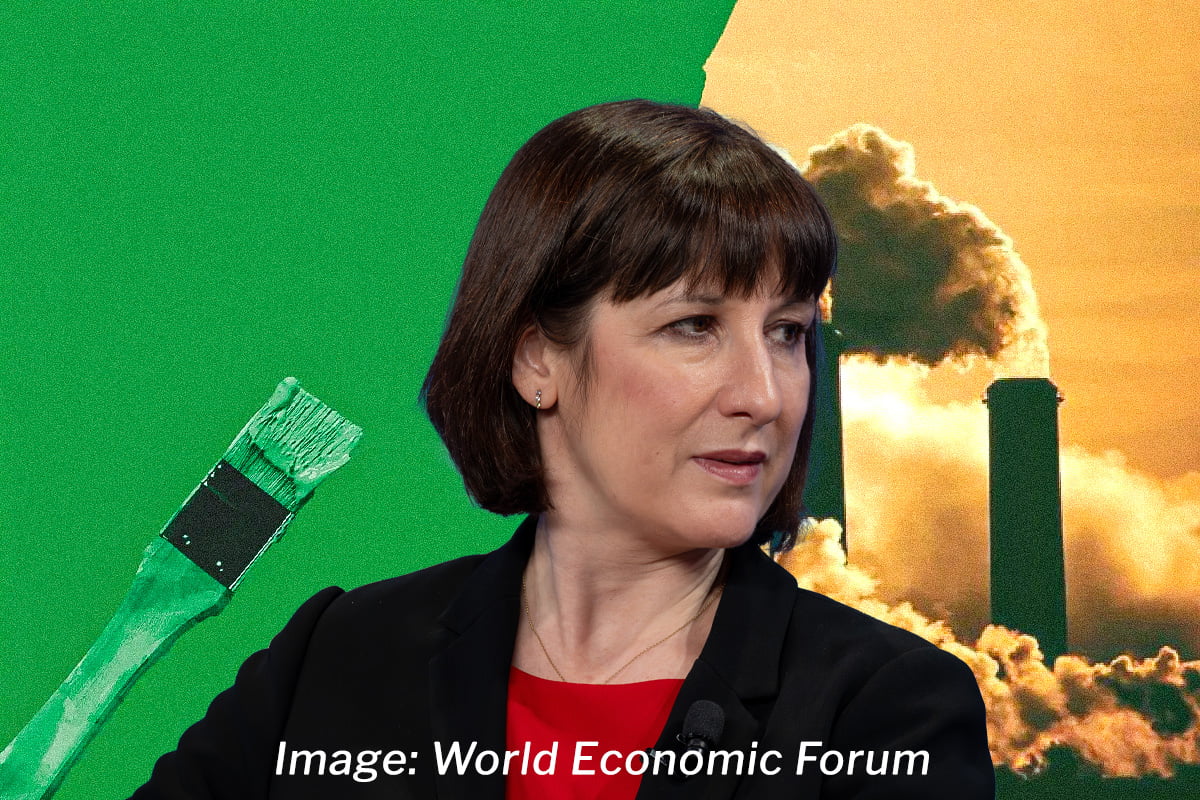In a speech last Wednesday, 29 January, Chancellor Rachel Reeves announced Labour’s strategy to “kickstart economic growth”.
The UK economy certainly needs a kick. British capitalism is fatigued, febrile, and frail; devoid of any dynamism.
According to analysis by the Financial Times, per person, UK output only grew by “a miserable 0.7 per cent a year” on average between 2008-23. And more recent data suggests that Britain saw no economic growth in the last few months of last year.
This puts the British economy on course for ‘stagflation’ in the months ahead, with prices rising and growth stalling, as Trump’s global trade war takes its toll.
‘Open for business’
Already, the financial markets’ jittery response to Labour’s Autumn Budget has put Whitehall in panic mode. Investors are demanding that the government balance its books. And alongside a further wave of austerity, this requires Britain’s economy to start showing some vim and vigour.

This was the intention behind the Chancellor’s recent speech – designed to demonstrate to the capitalists that Britain is ‘open for business’.
Reeves declared that her government would go “further and faster” to drive UK growth, outlining Labour’s corporate-friendly plans.
This includes backing for a third runway at Heathrow Airport, a key transport hub for international business; the creation of an Oxford-Cambridge ‘growth corridor’, linking the two university towns to stimulate research and development; and use of the country’s National Wealth Fund (who knew we even had such a thing?!) to support regional regeneration projects.
These proposals were accompanied by a host of other ‘supply-side’ measures, aimed at increasing the British economy’s productive capacity: removing restrictive ‘red tape’ on businesses; creating a “national jobs and careers service” to improve skills across the UK workforce; and so-called ‘reform’ of the welfare system (i.e. more cuts), in order to “get Britain working”.
This follows in the footsteps of Keir Starmer’s recent presentation of his ‘AI opportunities action plan’, which calls for Britain to embark on a campaign of tech-fuelled, “turbocharged” growth.
Broken Britain
The overall aim is clear: to boost growth through a combination of public and private investment. Unfortunately for Starmer and Reeves, however, what is less clear is whether they have any hope of realising these ambitions.
The strategists of capital are skeptical. Reviewing the Chancellor’s growth plan, the Financial Times, a sober mouthpiece of British capitalism, noted that “the UK has a long-standing problem with both public and private investment, sitting at the bottom of the G7 pack [of advanced capitalist countries] for much of the past 25 years”.
Regarding public investment, British governments have a poor track record, to say the least.
Years of decay and decline under the Tories have left Britain’s infrastructure crumbling and social fabric frayed. And Starmer’s government is keen to avoid – and unable to afford – further costly white elephants like HS2.
The prospects for private investment are no better. It seems that neither UK capitalists nor international investors are willing to take a punt on broken Britain.
Despite all of Starmer and Reeves’ schmoozing with billionaires and bankers, British bosses do not trust Labour to represent their interests.
New @CBItweets Growth Indicator show business sees another significant fall in confidence with output down -20%. Confidence at lowest level since 2022. Need Chancellors speech to set out detailed plan for growth for whole economy with immediate steps for high st in next 12 months pic.twitter.com/vhS4XScQBm
— Kate Nicholls OBE (@UKHospKate) January 27, 2025
Responding to the Chancellor’s recent announcement, CEOs stated that they remained cautious – citing the government’s imposition of increased taxes, costs, and workplace regulations on employers as a reason for their reservations when it comes to investing in the UK.
In particular, the capitalists have thrown shade on Labour’s supposed ‘New Deal for Working People’: a key pledge in the party’s manifesto, which promises workers and their unions improved rights on a range of employment-related issues.
In short, before they throw their ‘hard earned’ money into the UK economy, the bosses are demanding guarantees of a ‘flexible labour market’ – that is, a pliant workforce, with workers stripped of any protection against hyper-exploitation by the capitalists.
Class clashes
With the Employment Rights Bill currently working its way through Parliament, the stage is set for a full-frontal clash: between British bosses and the working class, and in turn within the Labour Party.
On the one side are the trade unions, pressuring a layer of Labour MPs to come out in support of stronger pro-worker legislation. On the other is big business, insisting that the government prove its capitalist credentials.
And it is evident which way Reeves and co. are leaning, with one anonymous Westminster advisor stating that “there is a view in the Treasury that this [bill] shouldn’t upset the growth apple cart too much”.
From battles over workers’ rights, to the controversy surrounding Heathrow expansion plans: Starmer’s Labour is increasingly being squeezed between the demands of big business, for greater profitability, and the demands of ordinary people, for decent working, social, and environmental conditions.
The result is plummeting support for Labour in the polls, alongside splits and divisions inside the party and at the top of government. And all this before the chaos of Trump’s tariffs even truly starts.
In truth, British capitalism is lost at sea: cut adrift from its main export market, the EU; failing to attract international investment; and with the threat of protectionism looming ever larger.
Far from seeing any robust, dynamic growth, Britain is set to be crushed between the big imperialist powers: forced to sell off the family silver, open its doors to corporate vultures, and attack workers’ jobs, pay, and conditions in an effort to entice investors.
This is the bleak future that lies ahead for workers in Britain under capitalism. Only a socialist planned economy – based on the expropriation of the big banks, major monopolies, and billionaires’ wealth – can offer a way forward.
Strategists of capitalism predict Britain IMF bailout
Will Collins, Leeds RCP
“The British are going to suffer a major currency and gilt crisis, either this year or certainly within the term of this Labour government.” So said bourgeois economist David McWilliams on his latest podcast episode.
In layman’s terms, this means the UK government is likely to be unable to pay its debts, due to a collapse in investors’ confidence in the British economy. Consequently, Starmer and co. will be forced to go cap in hand to the IMF, western imperialism’s global loan shark, to ask for a bailout.
According to Williams, until now, British capitalism has been able to cling on by “pimping herself out for anybody who will buy any bit of Britain”.
The country’s “standard of living”, the economist continues, “is rented and not earned”, adding: “And once it’s rented, the landlord or the creditor dictates not just the price, but the quantity of money you get.”
Now, Britain’s short-sighted capitalist class is quickly running out of rope.
An IMF loan would have many strings attached: deregulation, savage cuts, and massive privatisation.
Economist Philip Pilkington describes the outcome of this scenario in the starkest terms:
“The type of austerity imposed will not be like Irelands, which was a temporary austerity… that is not the future Britain faces…
“Britain kind of has an ailing and failing financial sector. And it’s been living beyond its means for too long. That means a permanent adjustment in living standards. The model isn’t Ireland, in terms of austerity; the model is Greece.”
To put this in perspective: after Greece’s IMF bailout, 500,000 people emigrated in search of decent prospects. Unemployment nearly tripled.
The level of austerity will be unprecedented in British history. It would mean the cutting of everything the British working class has fought for and won over the past 100 years.
Pilkington goes on to lament that “it’s destabilising politically, even before it’s hit the real heart of the crisis.”
As communists, we have a duty to boldly stare this reality in the face, and redouble our efforts to build the only force that can stop this capitalist madness.






